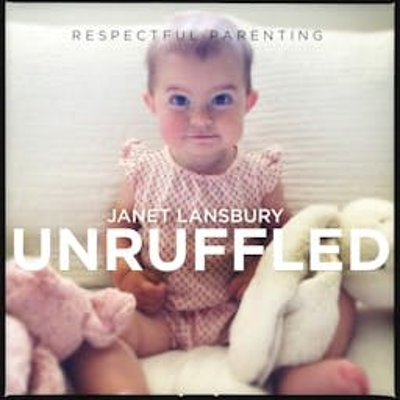
Respectful Parenting: Janet Lansbury Unruffled
Englisch
Kostenlos bei Podimo
Kostenlos hören bei Podimo
Starte jetzt und verbinde dich mit deinen Lieblingspodcaster*innen
- Vertraut von über 1 Mio. deutschen Hörer*innen
- Über 1.000 lokale Podcasts und Shows – nur bei Podimo
- Keine Zahlung nötig
Mehr Respectful Parenting: Janet Lansbury Unruffled
In the 25+ years Janet Lansbury has worked with children and parents, she's learned a lot. She's here to share it with you. Each episode of Unruffled addresses a reader's parenting issue through the lens of Janet's respectful parenting approach, consistently offering a perspective shift that ultimately frees parents of the need for scripts, strategies, tricks, and tactics. Janet is a parenting author and consultant whose website (JanetLansbury.com) is visited by millions of readers annually. Her work informs, inspires, and supports caregivers of infants and toddlers across the globe, helping to create authentic relationships of respect, trust, and love. Janet's "No Bad Kids Master Course" is available at NoBadKidsCourse and JanetLansbury. Her best-selling books “No Bad Kids: Toddler Discipline without Shame” and "Elevating Child Care: A Guide to Respectful Parenting" are available in all formats at Amazon, Barnes & Noble, or wherever you buy your books. Featured in The New Yorker, recommended 'Best Parenting Podcast' by The Washington Post, The New York Times, USA Today, The Cut, Fatherly, Today's Parent, and many, many more. Please note: This podcast is for informational and entertainment purposes only. The views and advice presented on this podcast by Janet Lansbury and her guests are based on their training and experience. Opinions are offered in good faith but do not constitute professional, psychiatric, or medical advice, neither are they intended to be. You do not have to use this information, and it should not be substituted for qualified medical expertise. Copyright JLML Press (2026) All Rights Reserved
Alle Folgen
455 FolgenRaising Can-Do Kids
Inspired by a couple's Instagram video of their determined toddler, Janet shares a 4-step sequence of responses to encourage our kids to persevere, even through frustration. Deddeh Howard's video: https://www.instagram.com/p/DKfLwy0p2q-/?hl=en [https://www.instagram.com/p/DKfLwy0p2q-/?hl=en] Janet's "No Bad Kids Master Course" is available at NoBadKidsCourse.com [http://www.nobadkidscourse.com/] and JanetLansbury.com [http://www.janetlansbury.com/]. Please support our sponsors! Learn more about your ad choices. Visit podcastchoices.com/adchoices [https://podcastchoices.com/adchoices]
Separation Anxiety, Meltdowns... The Solution Is Often in Our Face
Janet responds to questions from two parents who describe their sensitive children struggling with separation, transitions, and general emotional overwhelm. One writes, “I go into panic mode when I see his eyes widen with worry,” while another admits, “I often see the meltdown coming… and don’t know how to help without making it worse.” Both parents admit they have their own strong emotional reactions to their kids' struggles including fear, guilt, and self-doubt. Janet points out how our own discomfort can exacerbate our children's, and how caring for ourselves is both compassionate and foundational to effective parenting. She offers solutions how these parents might more readily trust their children to feel and process their discomfort. Janet's "No Bad Kids Master Course" is available at NoBadKidsCourse.com [http://www.nobadkidscourse.com/] and JanetLansbury.com [http://www.janetlansbury.com/]. Please support our sponsors! Learn more about your ad choices. Visit podcastchoices.com/adchoices [https://podcastchoices.com/adchoices]
Lost in Transition - How Changes Affect Our Kids' Behavior
Toddler twins are suddenly melting down at bedtime. A 5-year-old is struggling to manage his unruly friend. Janet explains how parents in both these cases can help to resolve these issues by better understanding their children's sensitivity to change. Janet's "No Bad Kids Master Course" is available at NoBadKidsCourse.com [http://www.nobadkidscourse.com/] and JanetLansbury.com [http://www.janetlansbury.com/]. Please support our sponsors! Learn more about your ad choices. Visit podcastchoices.com/adchoices [https://podcastchoices.com/adchoices]
The Year to Stop Doubting Yourself
Janet believes that one of the biggest hurdles for us as parents is our own self-doubt and hopes that 2026 will be the year we stop second-guessing ourselves. With this in mind, she offers suggestions to 3 families who've written to her about their current struggles. The first is a mom whose 2.75-year-old seems to be stalling during transitions and melting down when the mom doesn't comply with her demands. This parent says, "... my biggest struggle and question is how do we trust our kids' feelings and be there for them when we feel the pressure to keep our schedule on track and move forward?" A second parent is caring for three young children and worries she's not giving them enough play time with her. "I struggle to be playful and silly with my kids because I'm constantly navigating the mental load of being a mom of multiple children." Finally, a parent who just gave birth to her second child is feeling lost as to how to handle her 4-year-old's rudeness towards friends and family members. "This is the button she instinctively knows to push that will leave me ruffled and floundering as a parent because I greatly value manners, gratitude and politeness." Janet offers each of these families what she hopes is encouraging and helpful feedback. Janet's "No Bad Kids Master Course" is available at NoBadKidsCourse.com [http://www.nobadkidscourse.com/] and JanetLansbury.com [http://www.janetlansbury.com/]. Please support our sponsors! Learn more about your ad choices. Visit podcastchoices.com/adchoices [https://podcastchoices.com/adchoices]
Can We Be Sad or Angry And Still Be Unruffled?
A parent struggles to control emotions like anger, frustration, and disappointment when they’re triggered by her toddler. While she strives to be a confident leader by appearing calm and unruffled, she also wants to model her emotions authentically for her child. In this encore episode, Janet clarifies what it really means to be "unruffled" and how parents can approach this goal without faking or stuffing their emotions. Janet's "No Bad Kids Master Course" is available at NoBadKidsCourse.com [http://www.nobadkidscourse.com/] and JanetLansbury.com [http://www.janetlansbury.com/]. Please support our sponsors! Learn more about your ad choices. Visit podcastchoices.com/adchoices [https://podcastchoices.com/adchoices]















































